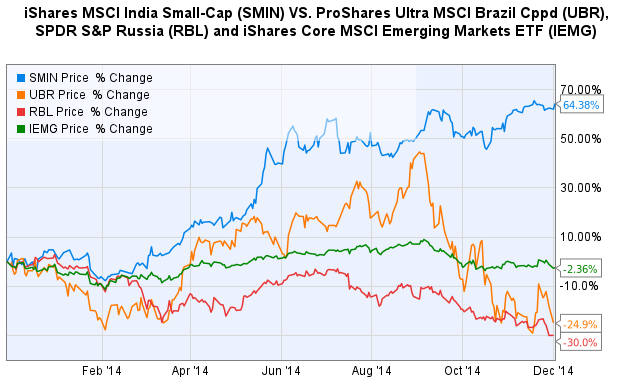3 Emerging Market ETFs Not Dependent on China
Post on: 17 Май, 2015 No Comment

Following a stellar finish in 2013, major U.S. equity benchmarks finally gave way to bearish forces during the final stretch of January. Profit taking pressures overwhelmed the bulls on the 23rd of last month after worrisome PMI data out of China signaled a contraction in the nations manufacturing sector for the first time in six months. In light of the stock markets run-up at the time, selling pressures swiftly permeated the scene, triggering more stop-losses along the way and further exacerbating the sell-off [see How To Beat The S&P 500 with Style ETFs ].
To top it off, investors at home have had even more reasons to step to the sidelines after digesting platefuls of uncertainty from the developing world; Thailands state of emergency declaration coupled with interest rate hikes in Turkey, India, and South Africa added to the laundry list of fiscal and political instability plaguing investors confidence. Suppose youre fortunate enough to have been sitting on cash amid the turmoil, then youre likely wondering if and when its safe to re-enter some of the bargain-priced overseas equity markets [try our Free ETF Country Exposure Tool ].
Dissecting which developing countries present the most lucrative growth prospects requires some good ole fashioned research. If we start with a traditional top-down approach, one of the first questions that comes to mind is answering how the various emerging economies out there are dependent on one another. In light of the recent China-induced sell-off, some might want to start their research by identifying economies that are not-so-dependent on the Asian powerhouse.
As such, below we highlight three ETFs that offer exposure to developing economies that are not extremely dependent on China; more specifically, China is not considered to be one of the top two trading partners (imports or exports) for the countries profiled below.
iShares MSCI Turkey ETF (TUR, B+ )
Turkey presents an interesting opportunity at the moment for a number of reasons. First and foremost, the Turkey ETF (TUR) has been absolutely beat down in fact, it has shed more than 40% since peaking on 5/22/2013. Attractive valuations aside, the Turkish economy itself is in a sweet spot. Geographically speaking, the country serves as a trading corridor between Europe and the Middle East; Turkeys biggest exporting partners in order are Germany, Iraq, Iran, and the United Kingdom. Furthermore, the fact that the services sector accounts for nearly two-thirds of its total GDP means the country can weather a serious downturn in Chinas economy, whereas more dependent commodity-exporters like Brazil and Australia would suffer big time [see What’s Inside the Turkey ETF ].
Turkeys economic independence from China coupled with its service-based economy makes it an attractive candidate for anyone looking to bet on an emerging market rebound that isnt highly dependent on Chinas growth resurgence.
iShares MSCI Mexico Capped ETF (EWW, A )
Whereas most emerging markets rely on China to drive demand for the goods and resources that they produce, Mexico is actually more closely tied to the worlds biggest economic powerhouse: the United States. Thats right, the U.S. economy powers Mexico in a big way, accounting for over three-quarters of its total exports. In terms of economic sector diversity, Mexico is predominantly a service-based economy although industrial activity accounts for more than a third of its GDP [see Macro Report: 2014’s Fastest Growing Economies ].
The Mexico ETF (EWW) is down nearly 18% from its peak on 4/11/2013, presenting an attractive buying opportunity for those who wish to dip their toes in a developing economy that is more dependent on improving growth at home rather than in China.
iShares MSCI Poland Capped ETF (EPOL, B+ )
While most of developed Europe remains plagued with anemic growth rates, the Polish economy is expected to grow by well over 3% in 2014 according to policymakers. As you may have suspected, China doesnt make the list of top trading partners for Poland; instead, this emerging European economy is closely linked with its developed counterparts in the region, with Germany accounting for the bulk of its exports and imports.
The Poland ETF (EPOL) is 12% off its peak on 10/29/2013, presenting an attractive entry point for anyone looking to bet on improving economic growth in Europe.
Follow me on Twitter @SBojinov
[For more ETF analysis, make sure to sign up for our free ETF newsletter or try a free 14-day trial to ETFdb Pro ]
Disclosure: No positions at time of writing.














